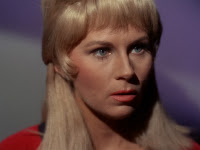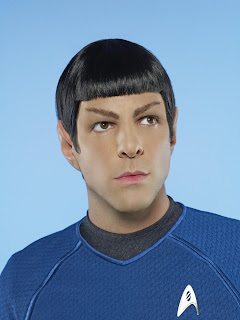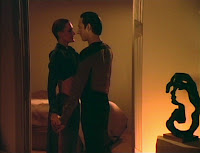"Charlie X" aired on September 15, 1966. It was the second episode of Star Trek to air. In it, the Enterprise takes aboard an orphaned human teenager called Charles Evans. Charlie was the sole survivor of a crashed vessel and survived on his own from the age of three on the planet Thasus. The Enterprise is to deliver Charlie to Colony 5 where his only remaining relatives live.
From the beginning, Charlie is awkward around others. He possesses none of the social graces and has no knowledge of the female sex. The first woman he meets is Yeoman Janice Rand. When Charlie asks Rand if she is a girl she simply gives him a strange look and Captain Kirk replies that yes she is a girl. Frequently on Star Trek, women are referred to as "girls" even if they are well into adulthood. For all Star Trek's protestations of equality of the sexes in the 23rd century the term girl is still a diminutive, suggesting that women are still considered less important than men.
As Charlie meets the crew and attempts to interact with them he begins to display a mighty obsession with Rand. In a recreation room, when Uhura is singing to entertain the crew, Charlie is frustrated that Rand's attention is not focused solely on him. He discreetly makes Uhura lose her voice so Rand will pay attention to him as he performs a card trick.
In an effort to escape from Charlie's interest, Rand introduces him to a young officer called Tina Lawton. Charlie is rude to Lawton, ignoring her and telling Janice that he only wants her. He then slaps Janice on her behind as she begins to walk away. Rand controls her temper and advises Charlie to seek out Captain Kirk for guidance.
Kirk tells Charlie that there are things you can do with girls and things you can't but he doesn't really try to explain why what Charlie did to Rand was inappropriate. Instead, Kirk attempts to ignore the subject and distract Charlie with physical exercise. This is another example of where standards of 1960s television conflict with the ideals of the 23rd century. Surely, a real 23rd century Kirk would not shirk from the duty of explaining the "birds and bees" to Charlie but on 1960s television such discussions would not have been permitted.
In this scene, Charlie finally gives away the fact that he has some kind of superhuman powers. When a crewman laughs at him while Kirk is teaching him how to fall during a fight, Charlie makes him disappear. In subsequent scenes, Charlie uses his abilities to hijack the Enterprise. Eventually, a Thasian ship arrives and it is revealed that the Thasians gave Charlie these abilities to enable him to survive on his own. Now, realizing the danger he poses to other humans, they insist on taking him to live with them despite Charlie's pleas to remain on the Enterprise.
This is a sad ending. Despite all that Charlie has done the audience can identify with him and sympathize with his plight. A lone toddler having to raise himself through adolescence and now, banished to live with beings who are non corporeal and can never understand him as a human might.
Charlie's story is obviously atypical for a human teen in the 23rd century but his interactions with the Enterprise crew provide some valuable insights into how men and women react in Roddenberry's universe.




























